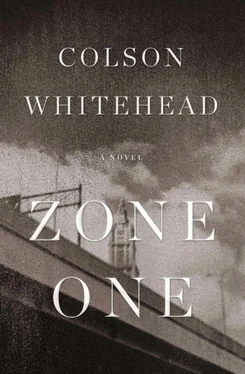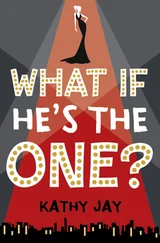Kaitlyn gently removed the piñata from Gary’s hands. “It’s tiresome, babysitting.”
Gary proposed that the human body required sugar after periods of extended exertion, and was rebuffed. Kaitlyn pulled out her notebook. “Mark Spitz?”
He went looking for the creature’s ID. The general theory contended that stragglers haunted what they knew. The where was obvious: You were standing in it. But the why was always somewhere else. This skel they’d discovered by the row of helium tanks, her hand dangling on a valve. She was wearing a gorilla costume. The costume draped off her shoulders, deflated on her shrunken form. She wasn’t wearing the head, which was nowhere in sight.
He was exhausted—they’d hit two res high-rises back-to-back, and there had been a lot of dead pets to lug down—but he couldn’t help sleuthing. Why did this cipher stake out this store, and this particular spot? On the wall by the register, next to the taped-up first-day-of-business good-luck dollar bills, a photograph captured a burly man surrounded by smiling children who nipped at the bag of candy he held an inch out of reach. The owner, let’s say. Mark Spitz glimpsed no family resemblance before he eliminated the straggler’s face. Was she the spouse, an employee or former employee, and if so, what about this place shouldered its way into her mentality, past the plague, summoning her here? Then there was the suit. Had she been infected while wearing the gorilla outfit, or put it on as she got sicker and sicker with the disease, and if this was the case, what made her select it as her shroud? Before the plague, the sight of someone walking the street in that costume wouldn’t have raised an eyebrow—Manhattan was Manhattan—and in its aftermath, such a vision added only a small portion of the prevailing macabre. Why her post by the helium tank, the paw on the valve that complicated the mystery? When Mark Spitz shot her in the head she brought down the tank with her. The gong of the thing hitting the floor was the loudest sound they’d heard in weeks, in that silent city. They jumped.
Mark Spitz unzipped the suit to check for a wallet. The skel was nude, her body mottled with brown plague spots. An apple-size chunk of meat was missing from her forearm. Perhaps the explanation of her outfit and how she made it to this spot was plausible in the context of her former life. But there was no one to tell her story. Mark Spitz’s bullet had transformed everything above her neck into globules of toxic fluid, gristle, and shards of bone.
Kaitlyn suggested Mark Spitz take a look-see in the back for an ID. He went into the recesses of the store. No light seeped from the street. He switched on his torch. The office conformed to the familiar disarray of small downtown businesses. Management had piled invoices, overstock, and decades of tax returns into a fortification of clutter that might protect them from extinction. The light from his helmet traveled over the file cabinets and boxes of seasonal merchandise, the lifeblood plastic Easter eggs and jack-o’-lantern streamers. He didn’t find her clothes, or any clues, and the next moment he was weeping, fingers curled into a nautilus across his face and snot seeping into his mouth, sweetly.
The next time they needed to fill out an Incident Report, Mark Spitz begged off, and eventually Kaitlyn took note and removed him from the detail. He had nerve damage: input could not penetrate. The world stalled out at his edges. Sometimes he had trouble speaking to other people, rummaging for language, and it seemed to him that an invisible layer divided him from the rest of the world, a membrane of emotional surface tension. He was not alone. “Survivors are slow or incapable of forming new attachments,” or so the latest diagnoses droned, although a cynic might identify this as a feature of modern life merely intensified or fine-tuned with the introduction of the plague.
Buzzwords had returned, and what greater proof of the rejuvenation of the world, the return to Eden, than a new buzzword emerging from the dirt to tilt its petals to the zeitgeist. In the recent calm, experts of sundry persuasion reconnected with their professions, hoping to get out of custodial duty and earn a ticket to Buffalo with the rest of the royalty. One canny psychotherapist—Dr. Neil Herkimer, who’d made a fortune in the days before the flood with a line of self-help books imparting “The Herkimer Solution to Human Unhappiness”—delivered the big buzzword of the moment: PASD, or Post-Apocalyptic Stress Disorder. Dr. Neil Herkimer climbed aboard a Buffalo-bound chopper soon after his diagnosis. As the chopper disappeared into the sky, he could be seen through the tiny window giving his buddies at Camp El Dorado a vigorous thumbs-up. Mark Spitz heard people jabbering about it over pea soup in the mess tents, or as he handed crates of powdered milk and vitamin supplements to eager survivors in the scattered camps from an armor-plated supply truck: Everyone suffered from PASD. Herkimer put it at seventy-five percent of the surviving population, with the other twenty-five percent under the sway of preexisting mental conditions that were, of course, exacerbated by the great calamity. In the new reckoning, a hundred percent of the world was mad. Seemed about right.
Buffalo shipped out “Living with PASD” pamphlets to the settlements in the packages containing work orders, dietary guidelines focusing on the realities of this age of scarcity (scurvy was a recurring character), and, of course, classified status reports on new reconstruction initiatives. The pamphlets were left on bunks and mess-hall seats; Buffalo knew exactly how many to print from the survivor rolls. Mark Spitz mulled the literature in the latrine. According to the specialists, symptoms included feelings of sadness or unhappiness; irritability or frustration, even over small matters; loss of interest or pleasure in normal activities; reduced sex drive; insomnia or excessive sleeping; changes in appetite leading to weight loss, or increased cravings for food and weight gain; reliving traumatic events through hallucinations or flashbacks; agitation or restlessness; being “jumpy” or easily startled; slowed thinking, speaking, or body movements; indecisiveness, distractibility, and decreased concentration; fatigue, tiredness, and loss of energy so that even small tasks seem to require a lot of effort; feelings of worthlessness or guilt; trouble thinking, concentrating, making decisions, and remembering things; frequent thoughts of death, dying, or suicide; crying spells for no apparent reason, as opposed to those triggered by the memories of the fallen world; unexplained physical problems, such as back pain, increased blood pressure and heart rate, nausea, diarrhea, and headaches. Nightmares, goes without saying.
A meticulous inventory with a wide embrace. Not so much criteria for diagnosis but an abstract of existence itself, Mark Spitz thought. Once American tongues tangled with the acronym, it got mashed up and spat out into an intriguing shape. To wit: the afternoon he returned to camp after a rainy day working the Corridor, in abominable Connecticut, and was about to check the day’s survivor roll. He hadn’t seen the name of anyone he knew for weeks. Mark Spitz was halfway to the rec center when he discovered one of the comm operators, Hank, crouching by the prostrate body of a teenage soldier whose fresh gear had obviously never been worn before. Probably the kid’s first foray out of camp since he came in from the wild. The soldier sprang in and out of a fetal posture, collapsing and exploding, smearing his body through a clump of vomit.
“What happened,” Mark Spitz asked, “he get bit?”
“No, it’s his past,” he heard the comm operator say. The recruit moaned some more.
“His past?”
Читать дальше












